Economics Essay: Assessing Minimum Wage's Role in Poverty Mitigation
VerifiedAdded on 2023/04/19
|7
|1567
|489
Essay
AI Summary
This economics essay examines the multifaceted impact of minimum wage on poverty, focusing on both its potential benefits and drawbacks. The paper begins by defining minimum wage and its historical context, including examples from Canada, the United States, and China. The essay then presents supporting arguments for increasing the minimum wage, such as its potential to decrease poverty in developing countries, especially when minimum wage earners are heads of low-income households. Conversely, it explores opposing arguments, including the potential for job losses and the limited reach of minimum wage policies. The discussion delves into the complexities of estimating wage effects and the differing impacts on various household members. The conclusion emphasizes that while minimum wage can be a tool for poverty reduction, its effectiveness varies depending on the specific economic context. The essay highlights the importance of considering both positive and negative consequences, and the impact on employment and employee turnover. The paper concludes by stating that one of the main purposes of the minimum wage is that it will stop employers from exploiting the workers and therefore poverty reduces when minimum wage increases.
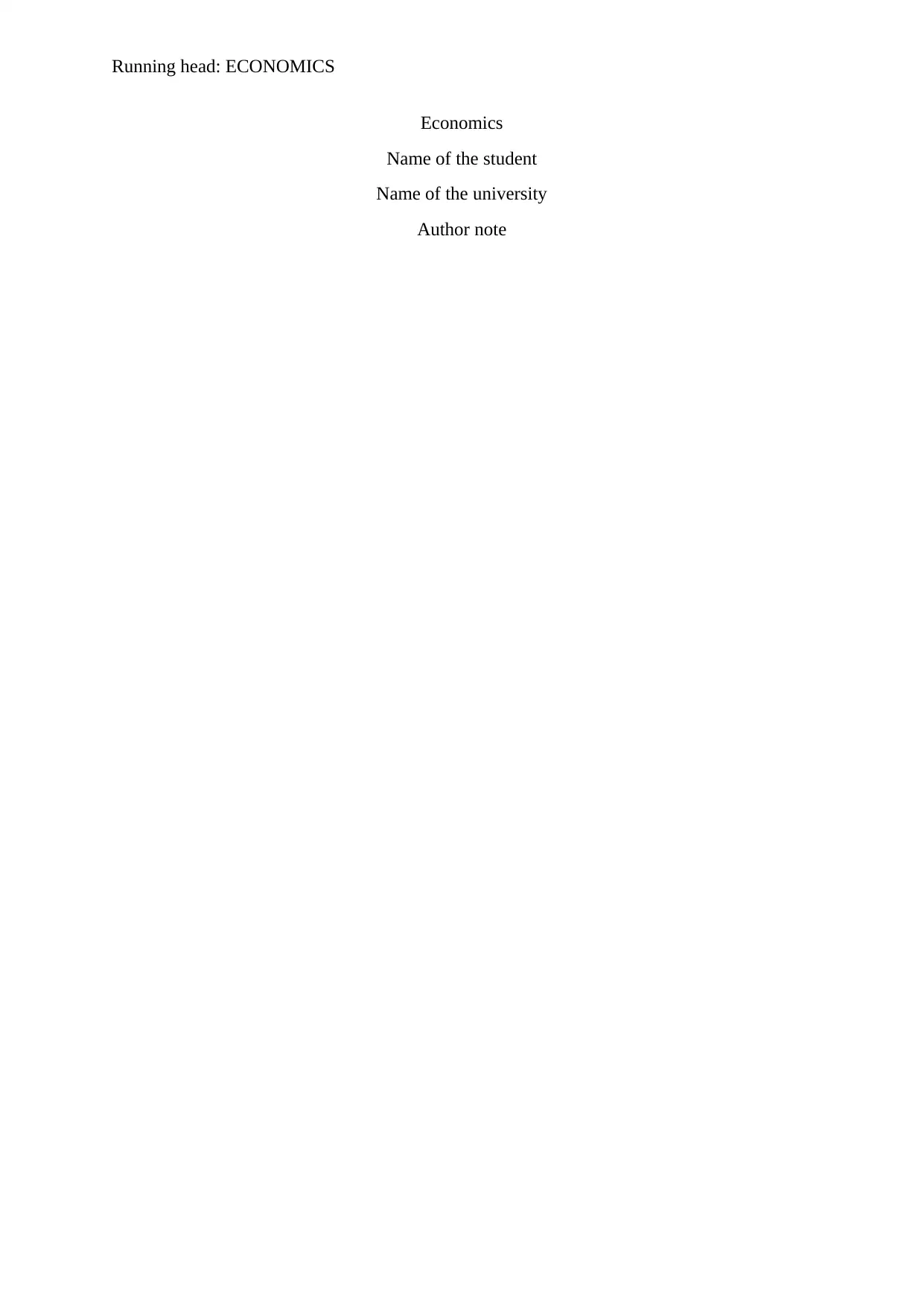
Running head: ECONOMICS
Economics
Name of the student
Name of the university
Author note
Economics
Name of the student
Name of the university
Author note
Paraphrase This Document
Need a fresh take? Get an instant paraphrase of this document with our AI Paraphraser
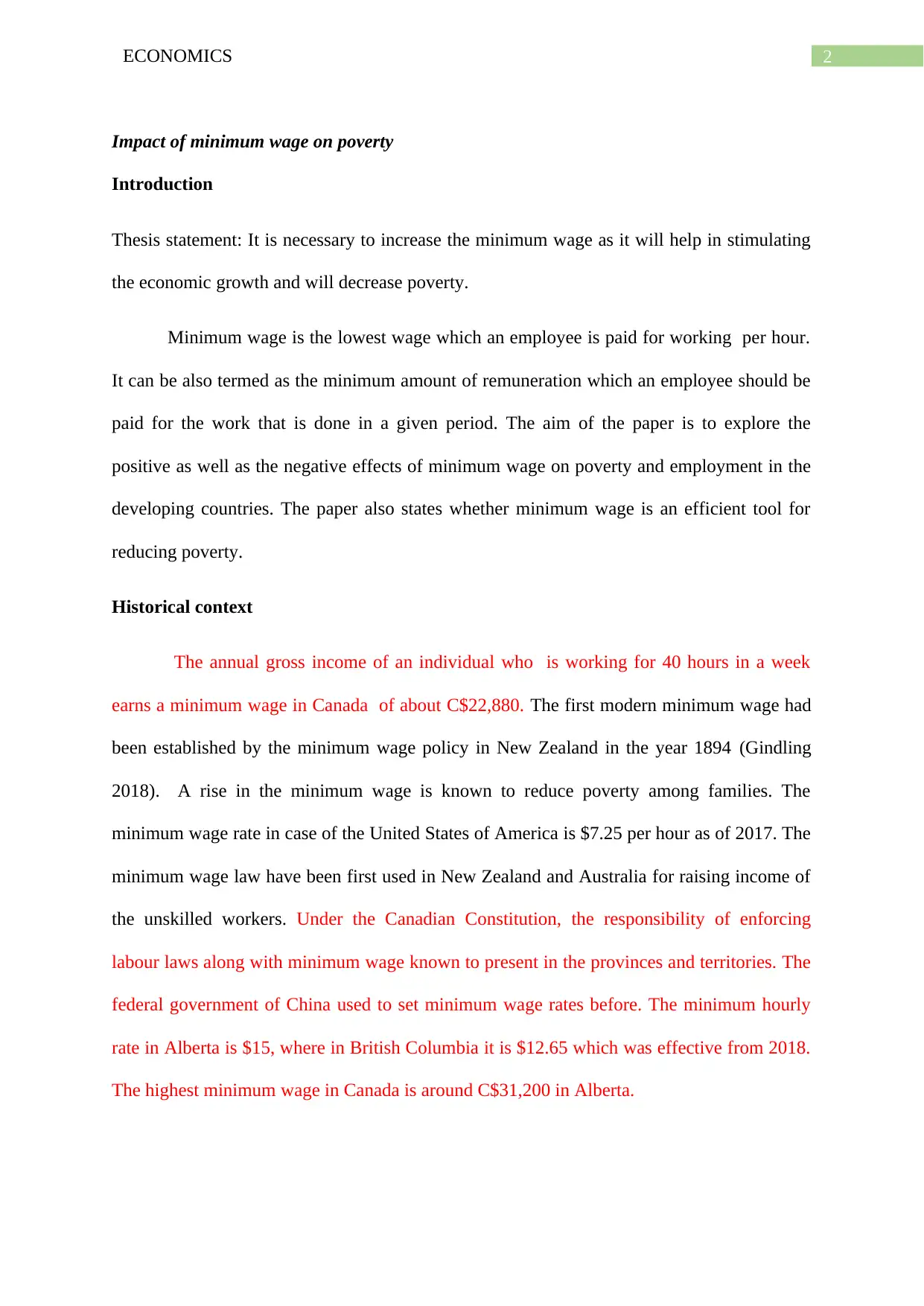
2ECONOMICS
Impact of minimum wage on poverty
Introduction
Thesis statement: It is necessary to increase the minimum wage as it will help in stimulating
the economic growth and will decrease poverty.
Minimum wage is the lowest wage which an employee is paid for working per hour.
It can be also termed as the minimum amount of remuneration which an employee should be
paid for the work that is done in a given period. The aim of the paper is to explore the
positive as well as the negative effects of minimum wage on poverty and employment in the
developing countries. The paper also states whether minimum wage is an efficient tool for
reducing poverty.
Historical context
The annual gross income of an individual who is working for 40 hours in a week
earns a minimum wage in Canada of about C$22,880. The first modern minimum wage had
been established by the minimum wage policy in New Zealand in the year 1894 (Gindling
2018). A rise in the minimum wage is known to reduce poverty among families. The
minimum wage rate in case of the United States of America is $7.25 per hour as of 2017. The
minimum wage law have been first used in New Zealand and Australia for raising income of
the unskilled workers. Under the Canadian Constitution, the responsibility of enforcing
labour laws along with minimum wage known to present in the provinces and territories. The
federal government of China used to set minimum wage rates before. The minimum hourly
rate in Alberta is $15, where in British Columbia it is $12.65 which was effective from 2018.
The highest minimum wage in Canada is around C$31,200 in Alberta.
Impact of minimum wage on poverty
Introduction
Thesis statement: It is necessary to increase the minimum wage as it will help in stimulating
the economic growth and will decrease poverty.
Minimum wage is the lowest wage which an employee is paid for working per hour.
It can be also termed as the minimum amount of remuneration which an employee should be
paid for the work that is done in a given period. The aim of the paper is to explore the
positive as well as the negative effects of minimum wage on poverty and employment in the
developing countries. The paper also states whether minimum wage is an efficient tool for
reducing poverty.
Historical context
The annual gross income of an individual who is working for 40 hours in a week
earns a minimum wage in Canada of about C$22,880. The first modern minimum wage had
been established by the minimum wage policy in New Zealand in the year 1894 (Gindling
2018). A rise in the minimum wage is known to reduce poverty among families. The
minimum wage rate in case of the United States of America is $7.25 per hour as of 2017. The
minimum wage law have been first used in New Zealand and Australia for raising income of
the unskilled workers. Under the Canadian Constitution, the responsibility of enforcing
labour laws along with minimum wage known to present in the provinces and territories. The
federal government of China used to set minimum wage rates before. The minimum hourly
rate in Alberta is $15, where in British Columbia it is $12.65 which was effective from 2018.
The highest minimum wage in Canada is around C$31,200 in Alberta.
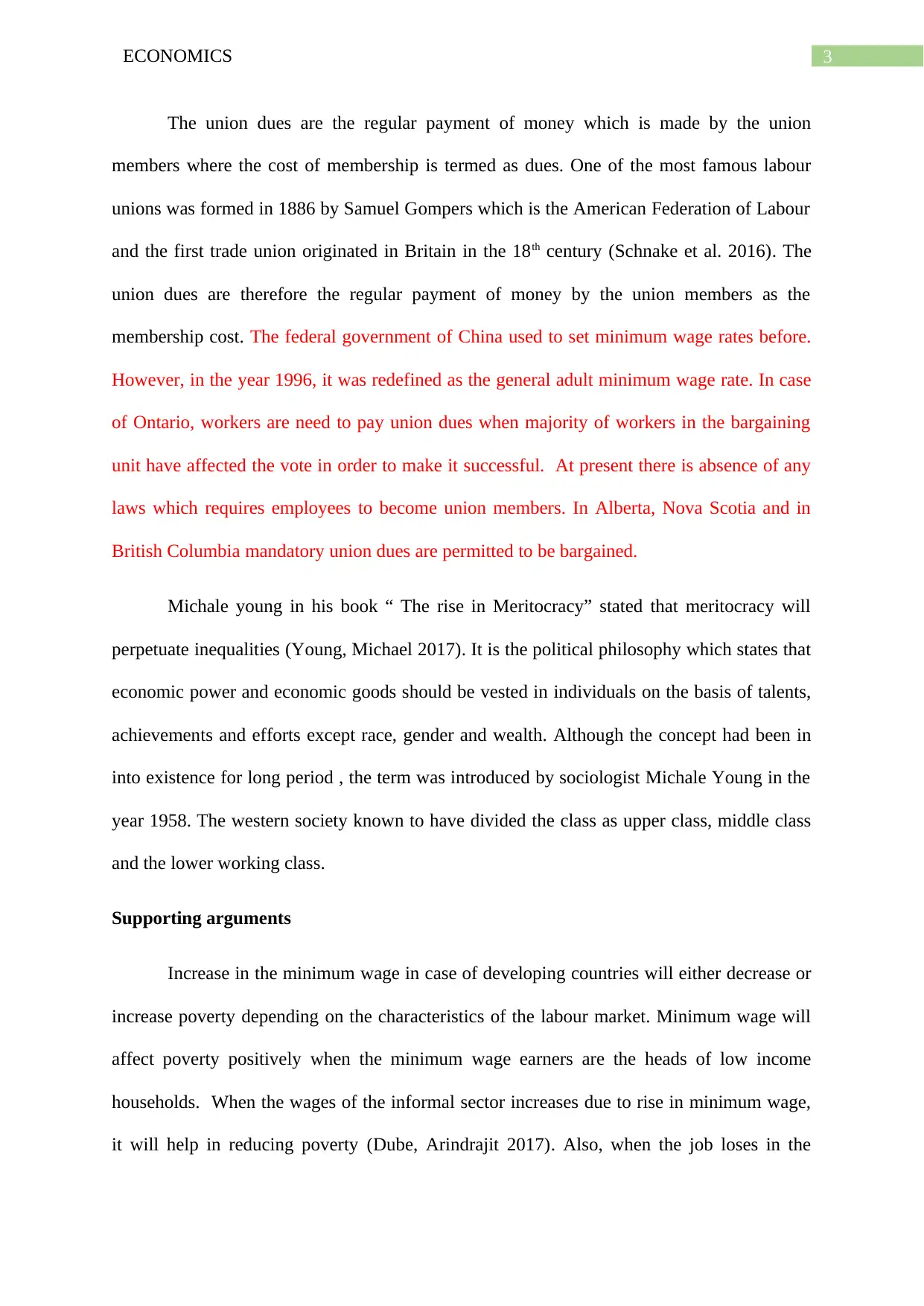
3ECONOMICS
The union dues are the regular payment of money which is made by the union
members where the cost of membership is termed as dues. One of the most famous labour
unions was formed in 1886 by Samuel Gompers which is the American Federation of Labour
and the first trade union originated in Britain in the 18th century (Schnake et al. 2016). The
union dues are therefore the regular payment of money by the union members as the
membership cost. The federal government of China used to set minimum wage rates before.
However, in the year 1996, it was redefined as the general adult minimum wage rate. In case
of Ontario, workers are need to pay union dues when majority of workers in the bargaining
unit have affected the vote in order to make it successful. At present there is absence of any
laws which requires employees to become union members. In Alberta, Nova Scotia and in
British Columbia mandatory union dues are permitted to be bargained.
Michale young in his book “ The rise in Meritocracy” stated that meritocracy will
perpetuate inequalities (Young, Michael 2017). It is the political philosophy which states that
economic power and economic goods should be vested in individuals on the basis of talents,
achievements and efforts except race, gender and wealth. Although the concept had been in
into existence for long period , the term was introduced by sociologist Michale Young in the
year 1958. The western society known to have divided the class as upper class, middle class
and the lower working class.
Supporting arguments
Increase in the minimum wage in case of developing countries will either decrease or
increase poverty depending on the characteristics of the labour market. Minimum wage will
affect poverty positively when the minimum wage earners are the heads of low income
households. When the wages of the informal sector increases due to rise in minimum wage,
it will help in reducing poverty (Dube, Arindrajit 2017). Also, when the job loses in the
The union dues are the regular payment of money which is made by the union
members where the cost of membership is termed as dues. One of the most famous labour
unions was formed in 1886 by Samuel Gompers which is the American Federation of Labour
and the first trade union originated in Britain in the 18th century (Schnake et al. 2016). The
union dues are therefore the regular payment of money by the union members as the
membership cost. The federal government of China used to set minimum wage rates before.
However, in the year 1996, it was redefined as the general adult minimum wage rate. In case
of Ontario, workers are need to pay union dues when majority of workers in the bargaining
unit have affected the vote in order to make it successful. At present there is absence of any
laws which requires employees to become union members. In Alberta, Nova Scotia and in
British Columbia mandatory union dues are permitted to be bargained.
Michale young in his book “ The rise in Meritocracy” stated that meritocracy will
perpetuate inequalities (Young, Michael 2017). It is the political philosophy which states that
economic power and economic goods should be vested in individuals on the basis of talents,
achievements and efforts except race, gender and wealth. Although the concept had been in
into existence for long period , the term was introduced by sociologist Michale Young in the
year 1958. The western society known to have divided the class as upper class, middle class
and the lower working class.
Supporting arguments
Increase in the minimum wage in case of developing countries will either decrease or
increase poverty depending on the characteristics of the labour market. Minimum wage will
affect poverty positively when the minimum wage earners are the heads of low income
households. When the wages of the informal sector increases due to rise in minimum wage,
it will help in reducing poverty (Dube, Arindrajit 2017). Also, when the job loses in the
⊘ This is a preview!⊘
Do you want full access?
Subscribe today to unlock all pages.

Trusted by 1+ million students worldwide
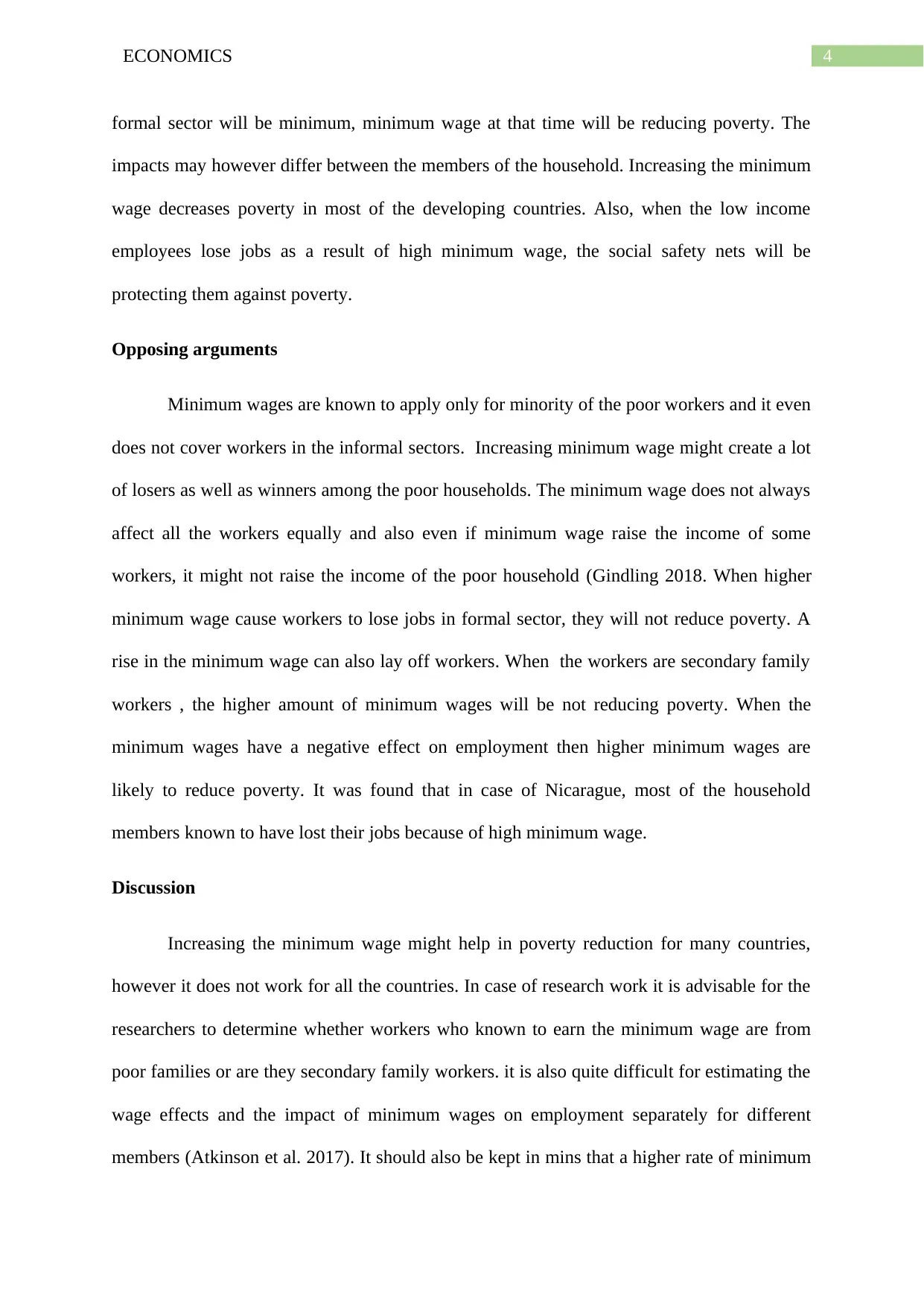
4ECONOMICS
formal sector will be minimum, minimum wage at that time will be reducing poverty. The
impacts may however differ between the members of the household. Increasing the minimum
wage decreases poverty in most of the developing countries. Also, when the low income
employees lose jobs as a result of high minimum wage, the social safety nets will be
protecting them against poverty.
Opposing arguments
Minimum wages are known to apply only for minority of the poor workers and it even
does not cover workers in the informal sectors. Increasing minimum wage might create a lot
of losers as well as winners among the poor households. The minimum wage does not always
affect all the workers equally and also even if minimum wage raise the income of some
workers, it might not raise the income of the poor household (Gindling 2018. When higher
minimum wage cause workers to lose jobs in formal sector, they will not reduce poverty. A
rise in the minimum wage can also lay off workers. When the workers are secondary family
workers , the higher amount of minimum wages will be not reducing poverty. When the
minimum wages have a negative effect on employment then higher minimum wages are
likely to reduce poverty. It was found that in case of Nicarague, most of the household
members known to have lost their jobs because of high minimum wage.
Discussion
Increasing the minimum wage might help in poverty reduction for many countries,
however it does not work for all the countries. In case of research work it is advisable for the
researchers to determine whether workers who known to earn the minimum wage are from
poor families or are they secondary family workers. it is also quite difficult for estimating the
wage effects and the impact of minimum wages on employment separately for different
members (Atkinson et al. 2017). It should also be kept in mins that a higher rate of minimum
formal sector will be minimum, minimum wage at that time will be reducing poverty. The
impacts may however differ between the members of the household. Increasing the minimum
wage decreases poverty in most of the developing countries. Also, when the low income
employees lose jobs as a result of high minimum wage, the social safety nets will be
protecting them against poverty.
Opposing arguments
Minimum wages are known to apply only for minority of the poor workers and it even
does not cover workers in the informal sectors. Increasing minimum wage might create a lot
of losers as well as winners among the poor households. The minimum wage does not always
affect all the workers equally and also even if minimum wage raise the income of some
workers, it might not raise the income of the poor household (Gindling 2018. When higher
minimum wage cause workers to lose jobs in formal sector, they will not reduce poverty. A
rise in the minimum wage can also lay off workers. When the workers are secondary family
workers , the higher amount of minimum wages will be not reducing poverty. When the
minimum wages have a negative effect on employment then higher minimum wages are
likely to reduce poverty. It was found that in case of Nicarague, most of the household
members known to have lost their jobs because of high minimum wage.
Discussion
Increasing the minimum wage might help in poverty reduction for many countries,
however it does not work for all the countries. In case of research work it is advisable for the
researchers to determine whether workers who known to earn the minimum wage are from
poor families or are they secondary family workers. it is also quite difficult for estimating the
wage effects and the impact of minimum wages on employment separately for different
members (Atkinson et al. 2017). It should also be kept in mins that a higher rate of minimum
Paraphrase This Document
Need a fresh take? Get an instant paraphrase of this document with our AI Paraphraser
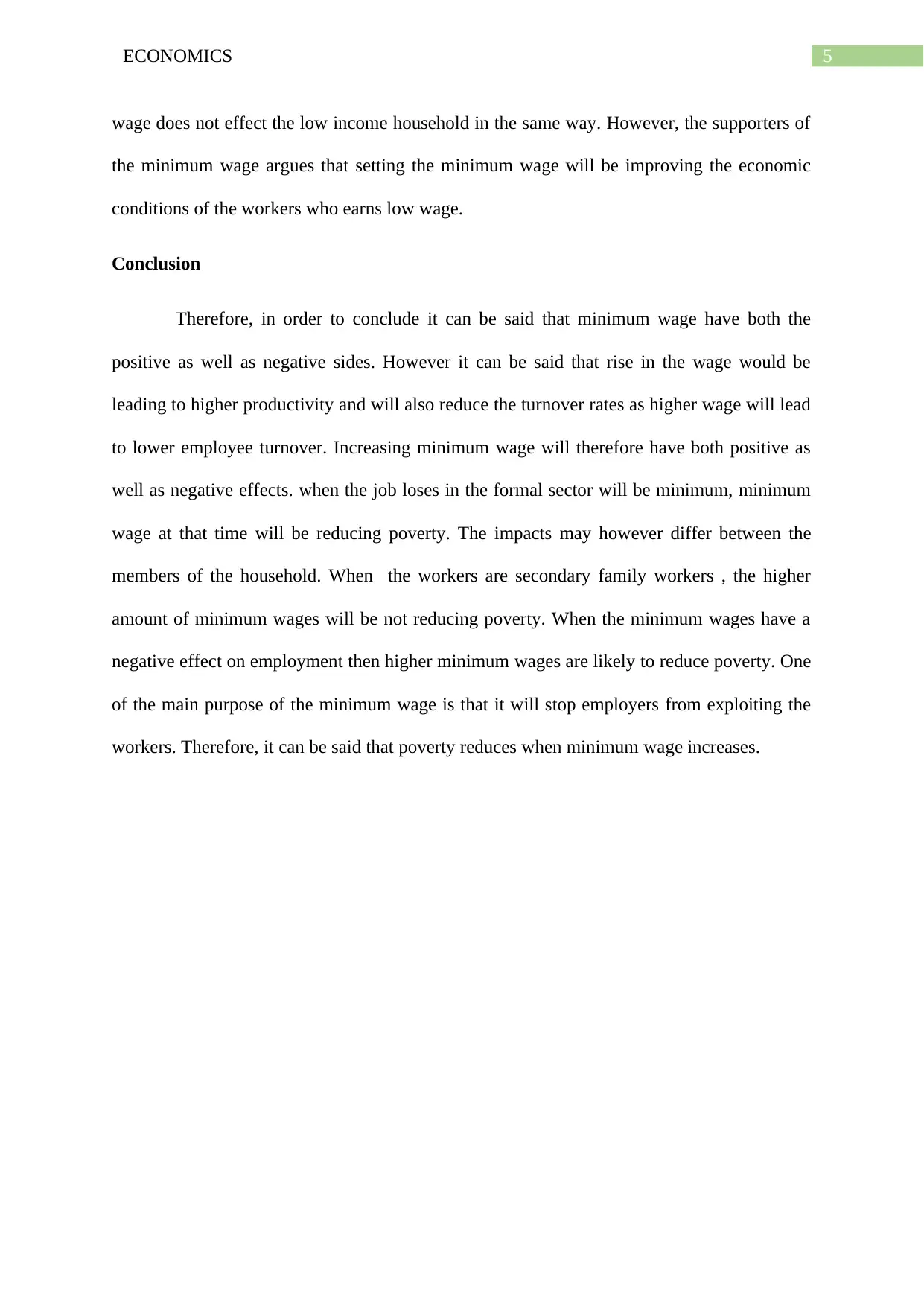
5ECONOMICS
wage does not effect the low income household in the same way. However, the supporters of
the minimum wage argues that setting the minimum wage will be improving the economic
conditions of the workers who earns low wage.
Conclusion
Therefore, in order to conclude it can be said that minimum wage have both the
positive as well as negative sides. However it can be said that rise in the wage would be
leading to higher productivity and will also reduce the turnover rates as higher wage will lead
to lower employee turnover. Increasing minimum wage will therefore have both positive as
well as negative effects. when the job loses in the formal sector will be minimum, minimum
wage at that time will be reducing poverty. The impacts may however differ between the
members of the household. When the workers are secondary family workers , the higher
amount of minimum wages will be not reducing poverty. When the minimum wages have a
negative effect on employment then higher minimum wages are likely to reduce poverty. One
of the main purpose of the minimum wage is that it will stop employers from exploiting the
workers. Therefore, it can be said that poverty reduces when minimum wage increases.
wage does not effect the low income household in the same way. However, the supporters of
the minimum wage argues that setting the minimum wage will be improving the economic
conditions of the workers who earns low wage.
Conclusion
Therefore, in order to conclude it can be said that minimum wage have both the
positive as well as negative sides. However it can be said that rise in the wage would be
leading to higher productivity and will also reduce the turnover rates as higher wage will lead
to lower employee turnover. Increasing minimum wage will therefore have both positive as
well as negative effects. when the job loses in the formal sector will be minimum, minimum
wage at that time will be reducing poverty. The impacts may however differ between the
members of the household. When the workers are secondary family workers , the higher
amount of minimum wages will be not reducing poverty. When the minimum wages have a
negative effect on employment then higher minimum wages are likely to reduce poverty. One
of the main purpose of the minimum wage is that it will stop employers from exploiting the
workers. Therefore, it can be said that poverty reduces when minimum wage increases.
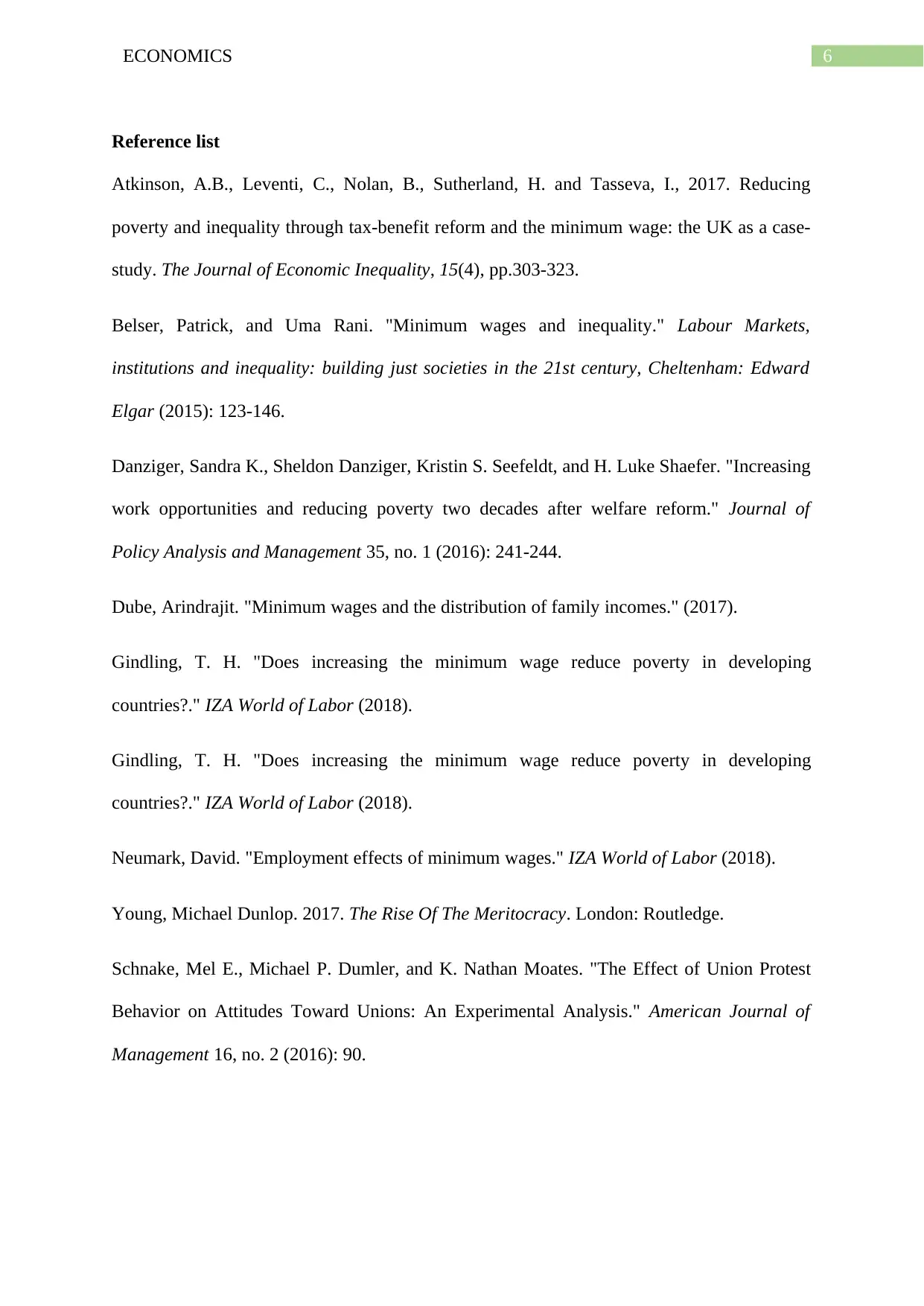
6ECONOMICS
Reference list
Atkinson, A.B., Leventi, C., Nolan, B., Sutherland, H. and Tasseva, I., 2017. Reducing
poverty and inequality through tax-benefit reform and the minimum wage: the UK as a case-
study. The Journal of Economic Inequality, 15(4), pp.303-323.
Belser, Patrick, and Uma Rani. "Minimum wages and inequality." Labour Markets,
institutions and inequality: building just societies in the 21st century, Cheltenham: Edward
Elgar (2015): 123-146.
Danziger, Sandra K., Sheldon Danziger, Kristin S. Seefeldt, and H. Luke Shaefer. "Increasing
work opportunities and reducing poverty two decades after welfare reform." Journal of
Policy Analysis and Management 35, no. 1 (2016): 241-244.
Dube, Arindrajit. "Minimum wages and the distribution of family incomes." (2017).
Gindling, T. H. "Does increasing the minimum wage reduce poverty in developing
countries?." IZA World of Labor (2018).
Gindling, T. H. "Does increasing the minimum wage reduce poverty in developing
countries?." IZA World of Labor (2018).
Neumark, David. "Employment effects of minimum wages." IZA World of Labor (2018).
Young, Michael Dunlop. 2017. The Rise Of The Meritocracy. London: Routledge.
Schnake, Mel E., Michael P. Dumler, and K. Nathan Moates. "The Effect of Union Protest
Behavior on Attitudes Toward Unions: An Experimental Analysis." American Journal of
Management 16, no. 2 (2016): 90.
Reference list
Atkinson, A.B., Leventi, C., Nolan, B., Sutherland, H. and Tasseva, I., 2017. Reducing
poverty and inequality through tax-benefit reform and the minimum wage: the UK as a case-
study. The Journal of Economic Inequality, 15(4), pp.303-323.
Belser, Patrick, and Uma Rani. "Minimum wages and inequality." Labour Markets,
institutions and inequality: building just societies in the 21st century, Cheltenham: Edward
Elgar (2015): 123-146.
Danziger, Sandra K., Sheldon Danziger, Kristin S. Seefeldt, and H. Luke Shaefer. "Increasing
work opportunities and reducing poverty two decades after welfare reform." Journal of
Policy Analysis and Management 35, no. 1 (2016): 241-244.
Dube, Arindrajit. "Minimum wages and the distribution of family incomes." (2017).
Gindling, T. H. "Does increasing the minimum wage reduce poverty in developing
countries?." IZA World of Labor (2018).
Gindling, T. H. "Does increasing the minimum wage reduce poverty in developing
countries?." IZA World of Labor (2018).
Neumark, David. "Employment effects of minimum wages." IZA World of Labor (2018).
Young, Michael Dunlop. 2017. The Rise Of The Meritocracy. London: Routledge.
Schnake, Mel E., Michael P. Dumler, and K. Nathan Moates. "The Effect of Union Protest
Behavior on Attitudes Toward Unions: An Experimental Analysis." American Journal of
Management 16, no. 2 (2016): 90.
⊘ This is a preview!⊘
Do you want full access?
Subscribe today to unlock all pages.

Trusted by 1+ million students worldwide

7ECONOMICS
1 out of 7
Related Documents
Your All-in-One AI-Powered Toolkit for Academic Success.
+13062052269
info@desklib.com
Available 24*7 on WhatsApp / Email
![[object Object]](/_next/static/media/star-bottom.7253800d.svg)
Unlock your academic potential
Copyright © 2020–2026 A2Z Services. All Rights Reserved. Developed and managed by ZUCOL.





